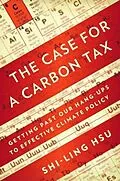There's a simple, straightforward way to cut carbon emissions-and we're rejecting it because of irrational political fears. That's the central argument of The Case for a Carbon Tax, a clear-eyed, sophisticated analysis of climate change policy.
Shi-Ling Hsu weighs the merits of the four major approaches to curbing CO2: cap-and-trade; command and control regulation; government subsidies of alternative energy; and carbon taxes. He does not claim that a tax is the perfect or only solution-but that unlike the alternatives, it can be implemented immediately and paired effectively with other approaches.
Hsu deftly explores the social and political factors that prevent us from embracing this commonsense approach. And he shows why we must get past our hang-ups if we are to avert a global crisis.
Autorentext
Shi-Ling Hsu is Professor at the University of British Columbia School of Law, where he has taught since 2004. Dr. Hsu has also been an Associate Professor at George Washington University. He has taught courses in Environmental Law, Climate Change, Law and Economics, and Property.
Prior to his academic career, Dr. Hsu was Senior Attorney and Economist for the Environmental Law Institute in Washington D.C; Deputy City Attorney in San Francisco; and practiced law with Fenwick & West in Palo Alto, California.
Professor Hsu has a B.S. in Electrical Engineering from Columbia University, a J.D., from Columbia Law School, and a M.S. in Ecology and Ph.D. in Agricultural and Resource Economics, both from the University of California, Davis.
Inhalt
Acknowledgments
Chapter 1. Introduction
Chapter 2. Climate Change Policy Alternatives
Carbon Taxes
Command-and-Control Regulation
Cap-and-Trade
Government Subsidies
Chapter 3. Ten Arguments for a CarbonTax
One: Economic Efficiency
Two: Excessive Formation of Capital
Three: Non-Interference with Other Regulatory Instruments or Jurisdictions
Four: Government Is Better at Reducing "Bads" Than Increasing "Goods"
Five: Incentives for Innovation-Price Effects
Six: Incentives for Innovation-Price Breadth
Seven: Administrability
Eight: International Coordination
Nine: Revenue Raising
Ten: Economic Efficiency Revisited: Prices versus Quantities under Uncertainty
Conclusion
Chapter 4. Arguments against a Carbon Tax
Political Economy Considerations
Regressiveness
Ineffectiveness
Crowding Out
Conclusion
Chapter 5. Carbon Tax Psychology
The "Do No Harm" Effect
The Identifiability Effect
The Endowment Effect
Conclusion
Chapter 6. Changing Political Fortunes?
Chapter 7. Conclusion
Endnotes
Index.
